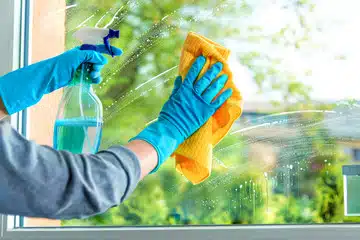It seems unsensible that cleaning your home could be wasteful and harmful to the environment and your family — but it’s the truth! Most cleaning supplies contain loads of unsafe chemicals and their packaging often creates long-lasting waste after you dispose of it. Zero waste cleaning is something you can adopt fairly easily and that can be healthier for your wallet, your family, and our world.
In this article, we’ll cover why you should care about zero waste cleaning, its benefits, and how you can get started with a few simple steps!
Quick Takeaways
- Many commercially made cleaning products are recalled every year, even from established and trusted brands.
- You can make safe, affordable, effective homemade cleaning products with ingredients you already have at home.
- One easy way to practice zero waste cleaning is with reusable supplies like cloth towels, wooden brushes, and steel buckets.
- Buying organic or looking for certification logos on cleaning supplies are the best ways to know if they’re eco-friendly and safe.
Why should you care about zero waste cleaning?
The most important reason to care about zero waste cleaning is the safety and health of your family. It’s impossible to keep track of the many chemicals in commercially manufactured cleaning products — chemicals that stick around in the air and on surfaces in your home, likely ending up on hands, household items, and food.
Cleaning products are recalled all the time for various safety reasons — even brands we know and trust the most. Just last year, 3M announced it would stop manufacturing many of its most used Scotchgard products because the chemicals were found to linger in humans and the environment for years.
These chemicals end up creating both water and air pollution when they’re disposed of after use. It’s estimated that the plastic packaging from many cleaning products will linger in landfills for centuries.
If this sounds quite doom-and-gloom, that’s because it is! Especially when there are affordable, simple alternatives that we can adopt to be more health conscious and environmentally friendly. The best part? Many of the homemade and/or green products we’ll cover in the next section are even more effective than the ones people have been buying off the shelf for so long!
Your easy guide to zero waste cleaning
Try homemade cleaning products
Some of the products you have in your cabinet or pantry already — baking soda, vinegar, alcohol, essential oils, hydrogen peroxide and even citrus fruit — can make all-purpose cleaners that are just as effective as the ones you’ll find in stores for pennies on the dollar.
This article from Good Housekeeping has natural recipes for everything from kitchen cleaner, brass cleaner, heavy-duty scrubbing, and clothing stain remover. Or check out the ideas for more cleaners with natural ingredients in the video below:
Buy eco-friendly tools
Think about the tools you use for cleaning: plastic toilet brushes, paper towels, dish sponges and more. We go through tons of them every year, tossing them once they’re gone or overused and replacing them over and over again.
It takes little effort to use longer-lasting tools that won’t create so much waste. Some simple ideas:
- Use cloth rags instead of paper towels. Rinse them with warm water and hang them to dry after minor clean-ups, and launder them weekly.
- Ditch dish sponges and use a wooden brush and reusable cloth. They work just as well and don’t need to be thrown out after just a few uses!
- Buy galvanized buckets — they’re made of steel and protected against corrosion. They’ll last much longer than plastic buckets.
- Use wooden dryer balls rather than dryer sheets (and add essential oils for scent!). They last longer and are made with natural ingredients.
- Use glass bottles instead of plastic. You’ll have to keep them out of reach from little ones, but they can be reused over and over again and are more easily recycled.
Check product labels
Maybe you’re not ready to start making your own cleaning products at home. Sometimes, too, we’re in situations where it’s unavoidable to buy cleaning products from the store. In either case, you can still take steps to be as eco-conscious as possible. By checking product labels to see their ingredients, you can choose the ones with the highest safety quality available.
The thing is, terms like “non-toxic” and “biodegradable” aren’t very closely regulated. Even when you see labels advertised with these terms, it’s not a sure thing that those products are actually safe for the environment.
So what do you look for?
One easy step is to look in the organic cleaning section. While not every organic product is created equally, you can feel confident that overall, these products are made with more natural ingredients and eco-consciousness than their non-organic counterparts.
Second, look for the Green Seal, Ecologo, Safer Choice, or USDA Biobased Product labels, which indicates that the products were required to meet certain standards to be certified.
Do your best!
Transitioning to zero waste cleaning can take time — and likely, you won’t be able to always do it perfectly. The key is to do your best and make decisions with intention. Even small, consistent choices to practice zero waste cleaning will make a big impact for your family and community!
If you’re moving to the Dayton area, Oberer Homes can help you find the home that’s right for you. Contact us today to get started!
Share this Post
